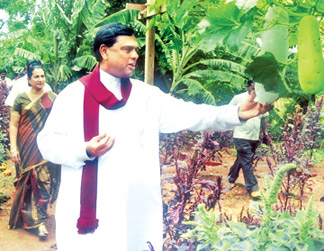|
Strengthening rural economy:
Govt to develop one million houses
By Dhaneshi YATAWARA
|

Minister Basil Rajapaksa on a visit to a home garden in Gampaha
|
In a bid to successfully face global economic recession and the
predicted world economic crisis, Sri Lanka is now strengthening the
rural economy, creating a solid base for the country to develop. The
Government is to launch a program to develop one million domestic
economic units islandwide, beginning from March under the leadership of
President Mahinda Rajapaksa. This mega development project is
coordinated by the Ministry of Economic Development under the direct
supervision of Minister Basil Rajapaksa and is implemented with the
participation of 18 other ministries.
"Under the Mahinda Chinthana - the Government's vision for tomorrow -
the goal is to establish resourceful, prosperous village units by
bringing them to an economically vibrant and upgraded social levels,"
said R.A.A.K. Ranawaka, Additional Secretary (Rural Economy) of the
Economic Development Ministry. "Through Gama Neguma the Government
addressed many problems of the village and now the focus is turned to
the family unit through this program," Ranawaka said. As he further
explained, though the Sri Lankan family unit is still the base of the
nation, weaknesses at certain points can be seen as it is also the most
volatile unit that brushes against the economic crisis and the impending
food shortage affecting the world. The time has come to cushion against
the impact of the global economic crisis.
Natural disasters have affected the economy of many countries such as
Chile, Brazil, Russia, India, Pakistan and Australia where they have
been to major portions of food that is consumed on a daily basis. Many
countries have either limits or bans exporting many essential food items
in order to feed their own people. In Sri Lanka, due to the recent
floods 150,000 acres of paddy lands have been destroyed. Thus it is high
time for Sri Lanka to derive the best out of the cherished family unit.
Structure
The structure of the especial program is designed in such a way that
families are fully supported in each locality. Explaining about the
basic structure of the new program, Ranawaka said that in every village
there are four government officials working at grass roots level i.e.
the Grama Niladhari, the Samurdhi Officer, the Agrarian Services Officer
and the Health Services Officer. These officials will be entrusted with
the task of supporting 100 families from each Grama Niladhari Division
in order to implement different projects. Performance will be monitored
by an Additional Secretary in each Divisional Development Secretariat.
These projects will be formatted to suit areas and terrains that they
are meant for. Families will be provided with fertiliser, plant
material, equipment, technical advice and other utensils free of charge.
Progress of the implementation of the projects will be monitored by
four officers who ill make frequent visits to families allocated to each
of them and details of progress of the project will be recorded in a
special format placed with each selected household. Shortcomings or
problems such as crop damage and property loss will also be identified
through these periodical inspection visits and remedial measures will be
provided.
Change
The earlier development framework 'Gama Neguma' was set up following
Maga Neguma which focused on infrastructure development of a village. 'Gama
Neguma' focused on economically empowering the village while providing
infrastructure development wherever necessary. The new home economic
unit program focuses mainly on four topics. One would be upgrading the
nutrition levels of a family unit and second would be lowering the daily
expenses of a family. Ensuring food security of the family and paving a
path for additional income generation.
This would definitely strengthen the village economy and the life
standard of its people. The setting up of one million domestic economic
units, a key component of the program, aims to create economically
strong and independent individuals cum families among other objectives.
The program is not only for home gardening. It also includes backyard
animal husbandry, household industries, fishing etc. Coconut cultivation
is one of the key components of the domestic home garden concept as
coconut is vital in reducing the cost of living.
The program will be monitored and supervised by task forces at three
levels - i.e. national, district and divisional levels. These teams will
assist grass roots level officers to productively manage the project.
"If villagers grow the type of crops sold in village fairs, there would
be an unnecessary clash with vendors.
Thus 100 families of a village will work according to a plan
benefiting the family as well as the village," he added.
"Though this sounds simple,it will be a very complicated task to run
this effectively," Ranawaka explained. Considering the fact that
developing these domestic economic units would be the ideal situation
and most sustainable, he added. |

